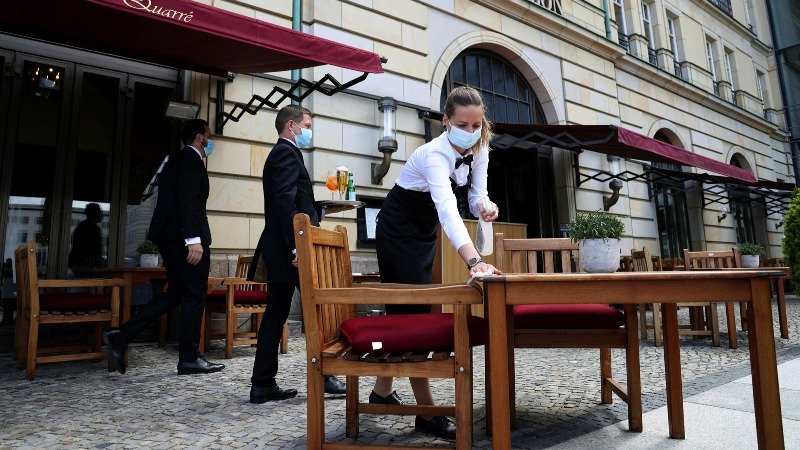After months of lockdowns, the German hospitality industry is struggling due to a lack of skilled workers as many switched industries during the coronavirus crisis.
“Roughly speaking, 85 per cent of the employees have remained loyal to us during the pandemic, and 15 per cent have looked for jobs in other sectors,” Ingrid Hartges, chief executive of the hotel and restaurant association Dehoga, told dpa in a recent interview.
Specifically, she said, the hospitality industry counted about 162,000 fewer full-time jobs in May 2021 than in May 2019 before the crisis. This included cooks, waiters and hotel specialists.
In view of closed restaurants and hotels, short-time work and uncertainty about the pandemic, some had looked for alternatives in retail or logistics or had been specifically poached, Hartges said. “It is therefore of elementary importance that the permanent opening of our businesses is now ensured.”
The shortage of skilled workers in the hospitality industry, which employs around 1.8 million people, was also felt by guests, she said. “Some restaurants have stopped serving lunch or only open in the early evening because they lack staff,” Hartges said. “Others have inevitably introduced days off.”
Cooks in particular, who were already in demand before the pandemic, are now in high demand, but also temporary staff in service. “The gap cannot be filled with mini-jobbers alone.”
The shortage of skilled workers threatens to worsen as the 2020 crisis led to a historic slump in the training market. Especially in the hospitality industry, far fewer new apprenticeship contracts were concluded, as calculated by the Federal Statistical Office.
Accordingly, there was a decline of 61.1 per cent for tourism clerks. For hotel specialists, the decline was 31 per cent and for cooks almost 20 per cent. In total, this makes a gap of some 5,000 new apprentices in these three professions alone.
Staffing concerns in the catering industry are not new – also because the working hours of chefs, for example, are rarely family-friendly and other sectors offer higher salaries.
This year, too, the trend is downwards: the number of registered apprenticeship places in the sector at the end of July was 13.5 per cent below the previous year’s figure and the number of registered applicants 18 per cent below, according to Dehoga. The association refers to figures from the Federal Employment Agency.
The hospitality industry lost a lot of turnover during the lockdowns. With the opening of the industry and the holiday season, hotels and restaurants in holiday regions did report good demand. However, city and conference hotels, caterers and clubs continue to complain of losses.
The industry’s NGG trade union recently warned of a brain drain. “If there are no clear perspectives for hotel employees and cooks, tens of thousands of employees could leave the hotel and restaurant industry in the next few months,” explained NGG president Guido Zeitler.
He also sees the ball in the employers’ court: they should negotiate with the NGG on a plan for the sector and commit to collective agreements and codetermination.
SPAKS MEDIA

